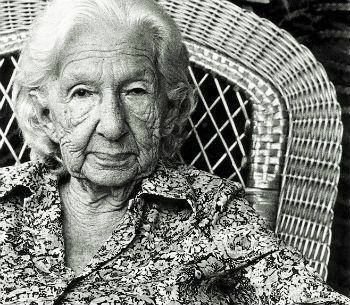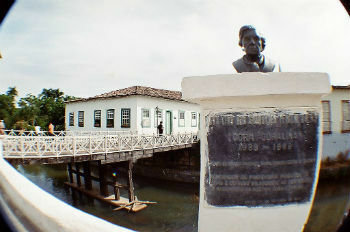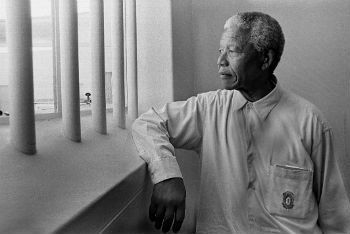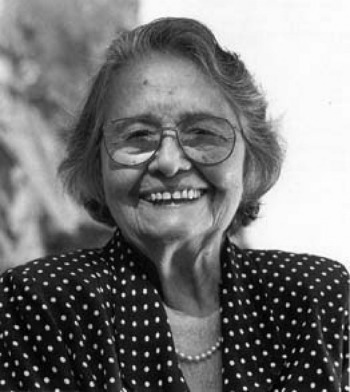Cora Coralina was a contemporary Brazilian poet and short story writer. A writer of simple things, she is considered one of the most important in the country.
Biography

Ana Lins dos Guimarães Peixoto Bretas was born in the city of Goiás, on August 20, 1889.
She was the daughter of Francisco de Paula Lins dos Guimarães Peixoto and Jacyntha Luiza do Couto Brandão. With only a month of life her father died.
She attended elementary school at Mestre Silvina's School. In 1900, she moved with her family to the town of Mossamedes. It was in her adolescence that Ana began writing and participating in literary cycles.
However, his first work “Poems from the Alleys of Goiás and More Stories” was published when she was 76 years old. For most of her life, she was a confectioner.
At the age of nineteen, she created the female poems journal “The Rose”, alongside her friends: Leodegária de Jesus, Rosa Godinho and Alice Santana. From there, she began writing short stories and chronicles under the pseudonym Cora Coralina.
In the same year, 1907, she assumed the vice-presidency of the literary cabinet in Goiás. In 1910, Cora published the short story “Tragédia na Roça”.
In that same year, he met the lawyer Cantídio Tolentino de Figueiredo Bretas and began living in the State of São Paulo. They married in 1925 and had six children with him, two of whom died. In 1932, Cora participated in the Constitutionalist Revolution in São Paulo.
In 1934, her husband died in the interior of São Paulo, in the city of Palmital. In São Paulo, she meets publisher José Olympio and starts selling books.
In 1936, Coralina moved to the countryside, in the city of Penápolis. She later moved to Andradina, also inland, and opened a fabric shop there.
In Andradina, Cora begins to write for the city's newspaper and is also a candidate for councilor in 1951. Five years later, she decides to return to her hometown.
In 1970, she took possession of chair number 5 at the Women's Academy of Letters and Arts of Goiás. And, in 1981, she received the Jaburu Trophy through the State Council of Culture of Goiás.
The following year, she receives the Poetry Prize in São Paulo. From the University of Goiás, Cora Coralina was awarded the title of Doctor Honoris Causa.
In 1984, she received the Juca Pato Trophy, being the first writer in the country to receive it. That same year, she joined the Goiânia Academy of Letters, occupying chair number 38.
She died in Goiânia, on April 10, 1985, aged 95, a victim of pneumonia.
Did you know?
After her death, the house where she lived the last years of her life was transformed into the Cora Coralina Museum. In 2001, the house in the city of Goiás was recognized by Unesco as a World Heritage Site.
 Cora Coralina Museum
Cora Coralina Museum
Construction
The most explored theme by the writer was, without a doubt, daily life. Although poetry was her main focus, Cora also wrote short stories and children's literature:
- Poems from the Alleys of Goiás and More Stories (1965)
- My Book of Cordel (1976)
- Vintém de Cobre - Half confessions by Aninha (1983)
- Stories from Casa Velha da Ponte (1985)
- Green Boys (1986)
- Treasure of the Old House (1996)
- The Gold Coin That Duck Swallowed (1999)
- Vila Boa de Goiás (2001)
- The Pigeon Blue Plate (2002)
poems
To learn more about the language and themes explored by the writer, check out three of her poems below:
Life woman
Life woman,
My sister.
Of all time.
Of all peoples.
From all latitudes.
It comes from the immemorial background of ages
and carry the heavy load
of the most vile synonyms,
nicknames and nicknames:
local woman,
street woman,
lost woman,
Woman for nothing.
Life woman,
My sister.
Aninha's Considerations
better than the creature,
made the creator the creation.
The creature is limited.
time, space,
norms and customs.
Hits and misses.
Creation is unlimited.
Exceeds time and means.
It projects itself in the Cosmos.
My destiny
in the palms of your hands
I read the lines of my life.
Crossed, sinuous lines,
interfering with your destiny.
I didn't look for you, you didn't look for me -
We went alone on different roads.
Indifferent, we crossed
You passed with the burden of life...
I ran to meet you.
Smile. We talk.
that day was scheduled
with the white stone
of the head of a fish.
And since then, we've walked
together for life...
Sentences
See some messages from the poet:
- “I climbed the mountain of life by removing stones and planting flowers.”
- “Nothing we live makes any sense if we don't touch people's hearts.”
- “We are all enrolled in the school of life, where the master is time.”
- “The knowledge you learn from the masters. Wisdom, only with the commonplace of life.”
- “Recreate your life, always, always. Remove stones and plant roses and make sweets. Restart.”
- “What matters in life is not the starting point but the walk. Walking and sowing, in the end you will have something to reap.”
Also read the article: Characteristics of Contemporary Brazilian Literature.



